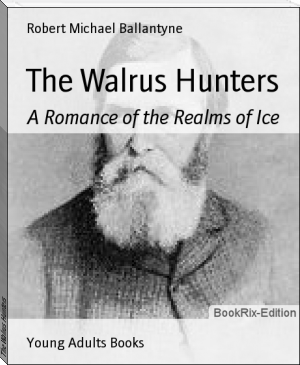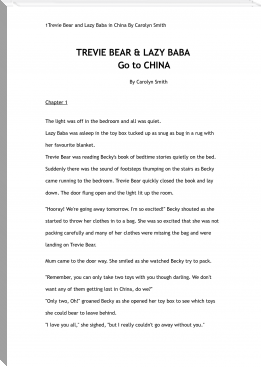The Walrus Hunters - Robert Michael Ballantyne (best book clubs .txt) 📗

- Author: Robert Michael Ballantyne
Book online «The Walrus Hunters - Robert Michael Ballantyne (best book clubs .txt) 📗». Author Robert Michael Ballantyne
One night he had what is styled a "run of bad luck." Being in something of a reckless mood, he went to visit a young friend who was as fond of gambling as himself, and took most of his worldly possessions with him. The friend, with a number of companions, was seated beside the wigwam fire, and quite ready to begin.
Taking a button, or some such object, in his hand, and putting both hands behind his back, the friend began to bob his head and shoulders up and down in an idiotic fashion, at the same time chanting in a sing-song monotone, "Ho yo, yo ho, hi ya yoho!" for a considerable length of time, while Mozwa staked his blanket, a fine thick green one, purchased at Great Bear Lake. We forget the friend's stake, but it was probably supposed to be an equivalent.
Suddenly the yo-ho-ing ceased, both hands, tightly closed, were brought to the front, and the whole party gazed at Mozwa with intense expectation. He was not long in making up his mind. He pointed to the left hand. It was opened, and found to be empty! The blanket was lost. Back went the hands again, and the "yo-ho-ing" was continued. The new gun was the next stake. It also was lost; and thus the game was carried on far into the night, with smaller stakes, until Mozwa had lost almost all that he had brought with him--gun, blanket, pipes, tobacco, flint and steel, fire-bag, and even his coat, so that he walked home a half-naked and nearly ruined man!
But ruin in the wilderness of North America is not usually so thorough as it often is in civilised lands, owing partly to the happy circumstance that strong drink does not come into play and complete the moral destruction, as well as the physical, which gambling had begun. The character therefore, although deteriorated, is not socially lost. The nature of property, also, and the means of acquiring it, render recovery more easy.
When Mozwa returned home _minus_ his new blanket and the beautiful deerskin coat which his wife had made and richly ornamented for him with her own brown hands while he was away, he found his old coat and his old blanket ready for him. The old gun, too, was available still, so that he was not altogether disabled from attending to the duties of the chase, and in a short time afterwards, "luck" being in his favour, he had won back some of his lost possessions. But he was too often in that fluctuating state of alternating excitement and depression which is the invariable accompaniment, in a greater or less degree, of the gambler's sin, whether carried on in the depths of the Arctic wilderness, the well-named "hells" of London, or the gilded _salons_ of Monaco.
"You are a fool," said Nazinred one day to his friend--for even among savages there are plain-spoken familiar friends gifted with common sense enough to recognise folly, and spiritual honesty to point it out and warn against it.
"Why does my brother say so?" asked Mozwa, who was not in the least offended by the observation.
"Because you gain nothing by all your gaining except trouble and excitement, and sometimes you gain loss. Here you are, now, obliged to take to your old gun, whose flint will hardly strike fire more than four times out of ten; you are obliged to wrap yourself in the old blanket full of holes; and you come to me to borrow powder and ball."
"That is true," replied Mozwa, with a look of self-condemnation. "But," he added, with a sort of brightly apologetic glance, "sometimes I win, and then I am well off, and it is Magadar who is the fool."
"Does it make you less of a fool because Magadar is one also? Are you comforted to-day, in your poverty, by the thought that you were well off yesterday?"
Mozwa's bright glance faded slowly. He was no match for his friend in argument, and, possessing an honest spirit, the look of self-condemnation began to creep again over his visage, but, being of a sanguine temperament and hopeful nature, the bright glance returned suddenly.
"Wisdom falls from the lips of my brother," he said. "I was well off yesterday and I am badly off to-day, but I may be well off again to-morrow--if I have good luck."
"Yes, and if Magadar has bad luck?" returned his friend. "You cannot both have good luck. Whatever one gains the other must lose--and so it goes on. Should wise men act thus?"
Mozwa was silent. His friend had never before spoken to him in this way. Indeed, no member of the tribe had ever before given utterance to such curious opinions. He knew not what to reply, and Nazinred relapsed into the moody silence which had characterised him more or less since he became aware of his daughter's departure.
The short autumn of those Hyperborean regions having passed away, the land was speedily locked in a garment of ice and snow, and the long stern winter began.
It was not long before all the lakes and rivers set fast. At first only the lakes solidified, then the more sluggish streams, while the rapids showed out inky black by contrast. Gradually the liquid margins of these were encroached on by the irresistible frost, until they were fairly bridged over, and their existence was only recalled to memory by hollow rumblings below the ice. At last the intensity of the cold overcame the salt sea itself; the floes, hummocks, and bergs became united into one universal mass, and every sign of liquid disappeared from the polar regions.
It was when this condition of things had arrived that the heart-crushed Nazinred proceeded to carry out a plan over which he had been brooding ever since his return from Great Bear Lake. His inquiries had led him to believe that the Eskimo who had carried off his child belonged to the tribe which had recently been pursued by his compatriots, and that they probably dwelt among the islands, some of which were seen, and others known to exist, off the Arctic coast opposite the mouth of the Greygoose River. Moreover, a faint hope, that he would have found it difficult to define, was aroused by the fact that the kidnapper of his child had formerly been the rescuer of his wife.
As we have seen, his first attempt to go off in his canoe in search of Adolay was frustrated by young ice forming on the sea, and for a considerable time afterwards the Arctic Sea was impassable to any kind of craft. Now that the sea had set fast, however, his difficulty was removed, and he resolved to undertake the journey on foot.
Well he knew that no man of his tribe, not even Mozwa, would agree to accompany him on such a wild-goose chase. He therefore not only refrained from making to any of them the proposal, but avoided any allusion to his intentions. Knowing also that Isquay was gifted with such an intense desire for sympathy that she could not resist communicating whatever she knew to a few of her dearest friends--in the strictest confidence--he did not mention the matter to her until all his preparations were completed. Then he told her.
Like a good submissive squaw, she made no objection, though the expression of her face showed that she felt much anxiety.
"Who goes with you?" she asked.
"No one."
"Is it wise to go alone?" she ventured to suggest.
"It may not be wise, but no one would go with me, I know, and I am determined to find Adolay!"
"How will you travel?"
"With a sledge and four dogs. That will enable me to carry food enough for a long journey. I will take my gun, of course."
"But what will you do for fire?" objected Isquay; "there are no woods on the ice."
"I will do without it."
The poor woman was so amazed at this reply that she gave up further questioning.
"You have plenty strong moccasins ready, have you not?" asked Nazinred, "and pemmican, and dried meat?"
"Yes, plenty. And your snow-shoes are mended, and very strong."
"That is well. I will take them, but I do not expect to use them much, for the snow on the Great Salt Lake is not soft like the snow in the woods."
It was afternoon when this conversation was held, and very dark, for the sun had by that time ceased to rise much above the horizon, even at noon. Late in the night, however, there was brilliant light both from the stars and the aurora. Taking advantage of this, Nazinred left his lodge and hastened to the outskirts of the village, where a little boy awaited him with the sledge and team of dogs all ready for a start.
Without saying a word the Indian put on his snow-shoes and took hold of the tail-line of the sledge, which was heavily laden, and well packed. With a slight crack of the whip he set the team in motion.
"Tell the old chief," he said to the boy at parting, "that I go to seek for my daughter among the people of the Frozen Lake. When I find her I will return."
CHAPTER SEVENTEEN.
NAZINRED'S JOURNEY OVER THE ARCTIC SEA.
While our Indian travelled through the woods he and his dogs were on familiar ground. He encamped at night in the way to which he had been accustomed all his life. That is to say, he selected a spot under a spreading fir-tree, dug away the snow until he got to the ground, which he covered with a carpet of pine branches. At one end of this encampment--or hole in the snow of ten feet or so in diameter--he made a huge fire of dead logs. At the other end he spread his blanket, unpacked his sledge, fed his dogs with some willow-grouse provided for the purpose, warmed up his pemmican and dried meat, melted some snow for drink, and spent the night in comparative comfort. And it is wonderful, reader, how cosy such an encampment in the snow is, when food is plentiful and health strong.
But when our Indian quitted the shore, and began his daring journey on the Arctic Sea, he was surrounded by new and unfamiliar conditions. No trees were to be had for firewood, no branches for bedding, no overhanging pines for shelter. He had gone there, however, prepared for the change.
The sea near the shore had been set fast when in a comparatively smooth condition, so that, the first day's march over, it was easy. As he had expected, the surface of the snow had been drifted quite hard, so that he could dispense with snow-shoes altogether, and the four dogs found the sledge so





Comments (0)